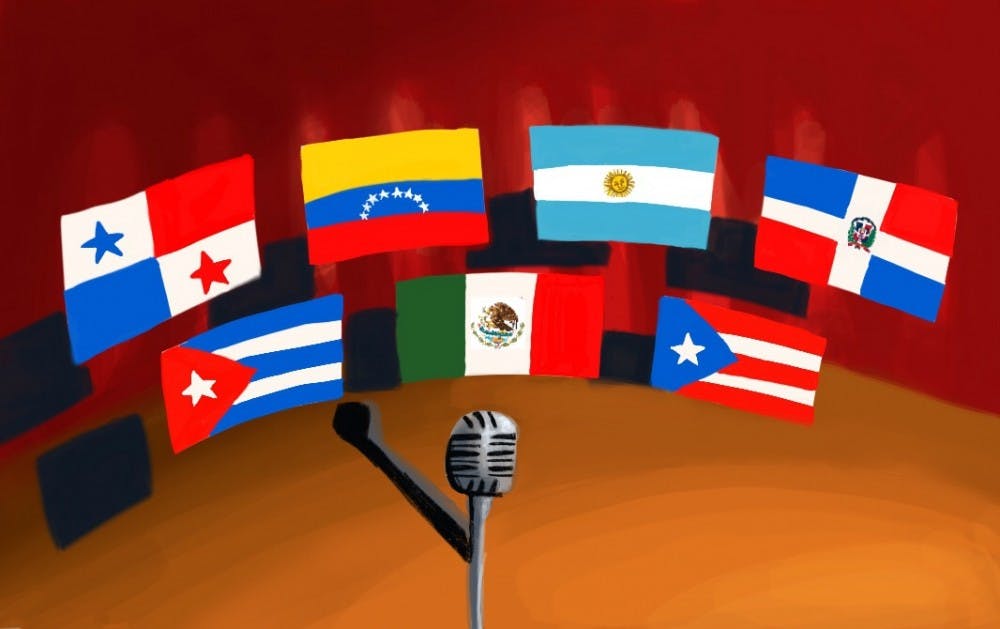Voz de Sparky, a bilingual open mic night, is coming to ASU's Downtown Phoenix campus in October as part of Hispanic Heritage Month.
Hosted by El Concilio, the event will take place Oct. 4 in the Cronkite building's First Amendment Forum.This year's theme is “Voces de la Calle" which translates to "Voices of the Street." Students are encouraged to recite poems, dance, sing or more during the open mic.
Arisbeth Valenzuela, El Concilio’s programming director and a junior studying anthropology and transborder studies, said the theme was inspired by a goal to be more inclusive and encourage anybody outside of the organization to share their experiences with race and social justice.
Valenzuela said Voz de Sparky came about from realizing the need to provide students with a safe space to express themselves and find validation by hearing stories of how others have gone through similar experiences.
“I think within myself, voicing my experiences and things like that, especially within predominately white settings, it’s very hard,” she said. “And being able to find a community within ASU, within El Concilio, and this coalition has helped a lot more. It’s helped me to become more in tune with who I am and being able to acknowledge my culture.”
She said the main goal of El Concilio is to “advocate, celebrate and educate not just the Mexican and Hispanic populations but (also) the entire Sun Devil community.”
For example, if member organizations need assistance for specific events, El Concilio is there to help, even if it’s just for moral support.
Read More: ASU’s Hispanic coalition seeks to eliminate stereotypes through cultural awareness
Other ASU clubs and organizations, including Chispa ASU, the Hispanic Research Center and the ASU School of International Letters and Cultures, are joining El Concilio in celebrating Hispanic Heritage Month across all ASU campuses with art exhibitions, film screenings, student discussions and more.
Brendan O’Connor, assistant professor at the School of Transborder Studies and a linguistic anthropologist, said the bilingual aspect is important because it allows students to be more comfortable by “not having to limit themselves to one form of expression or language.”
O’Connor said that having a sense of community is essential to helping students express themselves culturally and linguistically and feel at home at ASU.
“I like to think that we try to nurture that (sense of community) in our department by providing courses in spaces where students really feel like they can explore who they are from that perspective of their heritage,” he said.
O’Connor also said many students from a variety of backgrounds can relate to the stories shared at the open mic night and make a connection.
“I think it actually can help you appreciate the challenges of navigating a world that doesn’t always accommodate to you,” he said.
Ernesto Abeytia, faculty associate for the College of Integrative Sciences and Arts – Languages and Cultures, said the bilingual open mic night is unique because it creates a space for students to share experiences and find similarities.
“Events like this are essential to your understanding that will allow you to talk with people who are different, to listen to people who are different, to hear something new and ultimately see what connects us versus what divides us,” he said.
Abeytia, who is also a local writer and poet, said making these connections through art is important because it is a different way to understand those experiences more completely.
“I have a lot of students who are bilingual (and) who have something to say but don’t know how to say it,” he said. “And so my job is to help them see that, understand it and then give power to their own voices so that they can also express themselves.”
O’Connor said he doesn’t consider cultural identity to be something that has to be restricted to celebrations or special events, and for students, it has a strong connection to their academic work.
“I see it in the reason my students keep showing up for class,” he said. “They have a strong desire to contribute to their communities – to bring healing, well-being and knowledge.”
Reach the reporter at chofmann@asu.edu and follow @chofmann528 on Twitter.
Like The State Press on Facebook and follow @statepress on Twitter.




